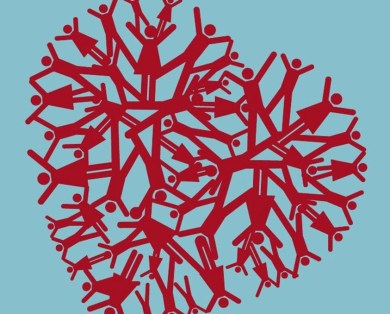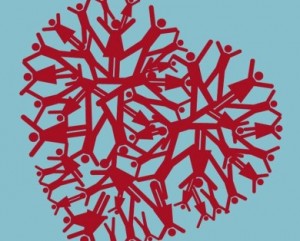The Good Life 2.0 – Valuing Community and Collaboration
By Davie Philip
If we really want to make the transition to a world that is healthy, sustainable and just, what values would society need to hold? Our values are the driving force behind our motivations, actions and behaviours, and examining them more closely could offer an insight into how we might bring about lasting positive change.
In this issue, I want to explore what values we would need to cultivate to make our communities healthy and flourishing places to live and work.
Our values dictate who we are, they reflect the way we treat each other and motivate us to do what we do. Our cultural values unite us as a collection of individuals and define what is acceptable or unacceptable in society. If we want to achieve lasting and positive behaviour change, we will need to understand the importance of values in driving engagement with social and environmental issues.
At the Convergence Sustainable Living Festival earlier this year, we brought together a very diverse group of civil society stakeholders to explore how we might better work together for the future we want. We invited Tom Crompton, a change strategist at WWF in the UK, to help ignite a conversation on the subject. Tom has been involved in a cutting-edge research project called “Common Cause: The Case for Working with Cultural Values”.
Common Cause stresses the need to engage people’s “intrinsic” or non-materialistic values, versus their “extrinsic” or materialistic ones. Extrinsic values are centered on external approval or rewards. Intrinsic values tend to satisfy people’s deep-rooted psychological needs, and are inherently rewarding to pursue. It is these values that need to be championed if we are to develop the collective will to deal with today’s global challenges. Common Cause is working with a wide range of groups, including environmental, developmental and children’s charities, to engage and strengthen these intrinsic values. This work can be found on their website: www.ValuesandFrames.org
The intrinsic values that need to be strengthened include equality, self-direction, creativity, empathy and the recognition that our prosperity will depend on healthy relationships – both with one another and with our environment. They also include the value placed on a sense of community, affiliation to friends and family, and self-development. Intrinsic values are associated with concern about bigger-than-self problems, along with the corresponding behaviours that will help address them. People tend to be more cooperative and caring when they prioritise intrinsic values. Unfortunately, these are the values that have been weakened or even ridiculed by our modern media.
Our dominant cultural institutions foster values such as a desire for wealth, social status, image and power. The thousands of advertisements we are exposed to every day tend to reinforce these extrinsic values. Related studies have documented that the more people prioritise these values, the lower their level of well-being and the greater their stress levels. The unsustainable aspirations and unhealthy behaviors that are now normal in our consumerist society are primarily driven by extrinsic values.
Of course, the values we hold are never all-extrinsic or all-intrinsic, but psychological tests held in 70 countries show that values cluster together in remarkably consistent patterns. Each of us hold, and are influenced by, both sets of values. However, the evidence suggests that the stronger someone’s extrinsic aspirations, the weaker his or her intrinsic goals will be. There is a “see-saw” relationship between intrinsic and extrinsic values. It seems that people who principally value financial success are less likely to be concerned about the environment, and have less empathy for others. Those who are motivated primarily from intrinsic values tend to have a stronger sense of self, and are less likely to be motivated by money or social power.
The social psychologists also found that values are mutually reinforcing. If someone holds some intrinsic values to be important, they are quite likely to embrace other intrinsic values. If you value treating people equally, for example, you are probably more likely to be motivated to make change happen in your community. Engaging one set of values supports and encourages compatible values, and associated attitudes and behaviours. On the flip side, if you place more importance on extrinsic values such as wealth or power, you will also tend to be concerned about your social status and image. Like exercising a muscle, repeated engagement of values will strengthen them.
Whatever area you work in, whether you are active on peace, environmental or human rights issues, recognising the importance of nurturing intrinsic values provides a common purpose that could help us work together for deeper systemic change. The many disparate initiatives that are working for positive change are linked by the values that underpin them. This understanding could encourage greater collaboration within and across different sectors, and help to build new coalitions. This value-based approach could unlock an opportunity to increase participation in political change and involvement in community life, as well as helping organisations and projects to cooperate more effectively.
Is it possible to discourage extrinsic values and encourage intrinsic values in people’s lives and in society? Is it ethical to even try? No campaign or communication strategies are ever value-free. Therefore, the question really becomes, which values do we want to champion?
When creativity, self-expression and critical thought are encouraged, values of self-direction are more likely to be engaged. By facilitating deeper involvement and participation in community life, we can help give people a sense of empowerment, and instill a pride of place in our neighborhoods. Getting involved in a community garden or a Transition Town initiative can be a great way to nurture these values.
However, a changing social, economic or environmental context is a powerful driver of value change. The values that were prevalent during the heady days of the celtic tiger are very different from many held now. This situation could, therefore, be a catalyst for an awakening of a movement of people that not only demand political change, improvements to our health system, global justice and the protection of our fragile biosphere, but are also living the change. The change makers we need today are active in their communities, participating in local groups, growing food, and exploring how, together, we can adapt to these changing times.
Today, we are confronting so many profound challenges and facing a historical turning point. This actually could be a ‘once-in-a-species’ opportunity to connect and play a part in the next stage of our culture’s evolution. Long-term systemic change is urgently required, and will need a clear understanding of the values that will underpin this transformation. The economic system that will replace this bankrupt one, the educational and health systems that will supersede the current ones and the flourishing communities, livelihoods and environment that are part of the future we want, will require us, the co-designers of these new systems, to hold intrinsic values.
Davie Philip is the director of Convergence, and runs the Community Resilience programme at Cultivate. He is a resident of the Cloughjordan Ecovillage and a board member of GIY Ireland. He conceived and directed ‘Surfing the Waves of Change’, a Cultivate short film that introduces the concept of community resilience, which can be seen at www.cultivate.ie


